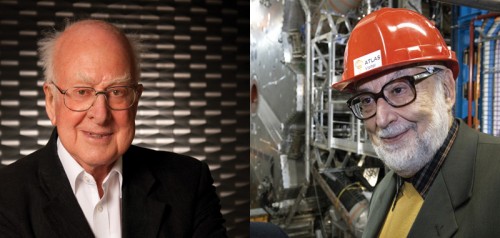
Peter Higgs (left) and François Englert, winners of the 2013 Nobel Prize for Physics. (Courtesy: Dirk Dahmer; CERN)
By James Dacey
The story goes that on the morning of this year’s Nobel Prize for Physics announcement, Peter Higgs had popped out for a leisurely lunch at a local pub without telling his colleagues at the University of Edinburgh. It meant that the Nobel prize committee in Stockholm was left scrabbling around trying to contact Higgs on several numbers, to no avail. We heard from François Englert in the slightly awkward phone conversation that customarily follows the prize announcement. But there was still no sign of the elusive Prof. Higgs.
Well fear not, because we will finally get to hear from the man behind the boson about his crowning achievement, via a free online course offered by the University of Edinburgh. The Discovery of the Higgs Boson is a seven-week course “about developments at the Large Hadron Collider, particle physics and understanding the universe”. Registration is already open for the massive open online course (MOOC), which starts on 10 February. It will feature interviews with Higgs himself and filmed lectures by a team of particle physicists at the University of Edinburgh, along with additional material including notes and further videos for more advanced students.
One of the course leaders, Christos Leonidopoulos, told physicsworld.com that there was an increase in subscriptions during the week of the Nobel prize announcement. “The recent discovery of the Higgs boson has captured the attention of a very broad audience not necessarily familiar with scientific achievements, to a level not seen since the Moon landings,” he says. “In particular, it has attracted the interest of a generation of young people to fundamental science. The 2013 physics Nobel prize, awarded jointly to professors Peter Higgs and François Englert, is expected to only reinforce these massive trends.”
The course registration page states: “A basic knowledge of physics is helpful, but not required.” But Leonidopoulos – who has worked on both the CMS and ATLAS experiments at CERN – says that a basic level of mathematical skills is required, equivalent to an A-level in England, Wales and Northern Ireland. A North American colleague here at Physics World informs me that this is roughly equivalent to the AP calculus course in the US but perhaps with a bit more physics knowledge.
MOOCs are part of a growing trend in the higher education sector whereby leading institutions are starting to offer online learning free of charge, or at low cost. The Discovery of the Higgs Boson is hosted via FutureLearn, a company wholly owned by the Open University, which has been offering distance learning and online education for over 40 years. There are many other MOOC providers in the US including the edX programme launched in 2012 by Harvard University and the Massachusetts Institute of Technology, which we profiled in this short film published earlier this year. Other popular MOOC providers include Coursera and Udacity.
Leonidopoulos believes that MOOCs such as this one will never replace traditional “bricks and mortar” education because you cannot recreate the personal interactions of a real-world classroom. Instead, he sees the rise of online education as a fantastic opportunity to extend education to wider audiences as well as providing a supplement to students attending traditional courses. “Today’s technology allows virtually anyone to reach out to a worldwide audience. However, there are two unique parameters here that make this particular Higgs MOOC very special: the timing and the message,” he says.
The MOOCS, it seems, are here to stay.
• Incidentally, if you can’t wait that long to hear from Peter Higgs about his famous work, you might want to listen to this candid interview he gave to Physics World last year.
*God particle divides physicists* This is a troubling point for teaching on-line. This is evident in the following point. Neil Turok, the Director of Perimeter Institute, gave the welcome speech to participants of P.S.I. program on 5th September, this year. There he mentioned that he was in CERN at the time of announcement of discovery and he observed many experimentalists very happy with the discovery and many theorists very sad and confused. This is a troubling situation for teachers for motivating young students to take up challenges in an advanced physics, like this one, while teaching basic physics in schools and colleges.